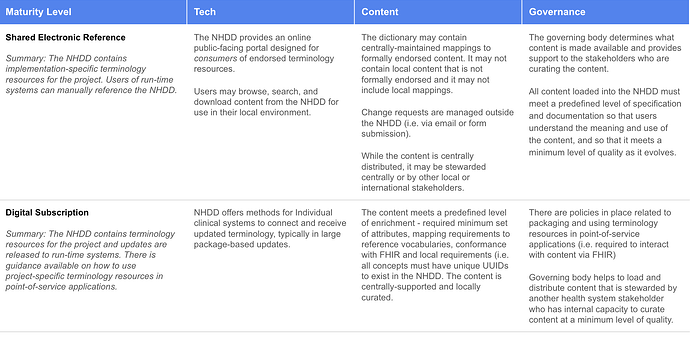Purpose and Context
One of the outputs of the OCL fellowship this summer is to enhance the NHDD Conceptual Framework by adding use cases. Use cases are a helpful tool for requirements specification, communication, design guidance, forming a test plan, taking a user-centered perspective, and clarifying project scope.
For the NHDD Conceptual Framework specifically, use cases are a helpful way to outline the capabilities of the NHDD at each stage of the maturity model and provide the initial scaffolding for a technical or programmatic roadmap. Additionally, documenting the NHDD use cases for different health system use cases helps show how an NHDD can support a variety of projects.
Use Cases
I outlined high-level use cases for each component of the conceptual framework and each stage of the maturity model – tech, content, and governance and shared electronic reference, digital subscription, and data exchange.
Draft Summary View: How does an NHDD support a health system use case at each stage of NHDD maturity?
To start, I focused on use cases for International Patient Summary (IPS), using IPS Brazil as a case study. An NHDD can serve as the authoritative reference for IPS implementation, facilitate mapping of local codes to standard IPS terms, and support real-time translation of a patient summary to local dialects.
Process
To inform the use case descriptions I pulled information from past projects, such as Kenya’s National Health Terminology Service (KNHTS) and Ethiopia NHDD, and existing OCL and NHDD resources. The OCL NHDD team reviewed and provided input on the use cases as I iterated on them. Thank you to Jon, Joe, Andy, and Geoffrey for your contributions!
One of the key challenges that I faced in documenting the use cases was keeping a clear distinction between tech, governance, and content. These components overlap but teasing apart the unique parts helped to clarify and refine the use cases so that the value proposition for each stage of maturity and each component was clear.
Impact and Benefits
Having a well-documented set of use cases for the NHDD will benefit future NHDD implementers by helping them to understand the capabilities and value of an NHDD over time. Use cases clearly describe what the system can support, helping stakeholders understand the requirements and functionality as well as how it interacts with the existing health information landscape.
The use cases could be further developed by expanding on additional health system use cases such as national data warehouse submission, M&E reporting such as country reporting of results to MOH and PEPFAR, eClaims, and SMART Guideline Implementation.
We’ll be discussing the use cases at the upcoming OHIE TS calls on August 2 and September 6. All are invited to join the conversation!

